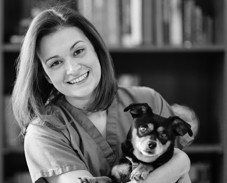 Every once in a while, we get an extra special thank you from one of our clients. A few months ago, MVA’s oral surgeon Dr. Corinne Durand performed tooth extractions on a very handsome older gentledog named Jack. His owners didn’t know it at the time, but it turns out that some broken teeth were the cause of his strange eating habits. These days, Jack has a new spring in his step, and we’re thrilled that his owners sent us this darling video!
Every once in a while, we get an extra special thank you from one of our clients. A few months ago, MVA’s oral surgeon Dr. Corinne Durand performed tooth extractions on a very handsome older gentledog named Jack. His owners didn’t know it at the time, but it turns out that some broken teeth were the cause of his strange eating habits. These days, Jack has a new spring in his step, and we’re thrilled that his owners sent us this darling video!
Jack's Story (as told by his owners)
We adopted Jack at ten years old in May 2013. He had a couple of habits that we had to get used to, and we had a couple of habits that he had to get used to. There was a slight adjustment period. Which I think was harder for him, since he appeared to have lived with a family before coming into ours. He had a little food aggression issue for the first couple days with our other dog, but those left quickly, once he realized my other dog wouldn’t steal his food.
Once we got accustomed to each other’s quirks, I started to notice some things that weren’t just a passing phase, which may come with a nervous dog in a new home. He didn’t always want to eat. Our other dog was fed twice a day, so that’s what we started doing with Jack. There would be several days that he would skip breakfast, and the food would sit in his bowl until late evening when he would finally eat it. When he did eat, he would stand over his bowl staring at it, and then walk away – doing this a few times before he would actually start eating. Not knowing the type of diet he had for ten years of his life, we thought maybe this just wasn’t the food he was used to. But in our minds, he had to eat this food, because he had arthritic joints and we were giving him a prescription diet for joint disease. Then there would be days he’d eat both meals, so we chalked it up to Jack being Jack.
Another thing he did was rub his mouth on the carpet after he would eat, and when given a treat he would take it gently, try to take a bite, and it would drop out of his mouth. Eventually, he would eat it off of the floor in a few bites. Our other dog inhaled hers! So we expected Jack to do the same, but then thought, he’s just being polite.
Then, one day Jack’s breath started to smell really badly. I thought he might need his teeth cleaned, so my vet recommended that we see oral surgeon Dr. Corinne Durand at Metropolitan. She did specialized dental x-rays and it turns out, Jack had two old fractured teeth, one down to the pulp!
So I scheduled the procedure a couple days after our appointment. Surgery went well and we got to take him home that night. He had to have soft foods for ten days – which I knew he already loved, but because soft food wasn’t supposed to be as good for their teeth, I wanted to keep him on kibble. So he ate his twice a day meals of soft food for ten days. I decided that after ten days I would still wet his kibble just to be sure he was in the clear.
The thing I discovered was that for the first time in almost three years, Jack got excited to eat! At first I thought it was just the soft food, but then when I switched back to the kibble, his tail would wag just as hard and he’d jump just as high to get his food. Before that, he would walk out of the kitchen when he heard me getting his food out!
Not only that, I noticed that he was all around happier. I could see it in his eyes. I could see it in the way he was playing. I could also see that he wasn’t dropping his treats anymore when I gave them to him AND he wasn’t rubbing his face on the carpet after he ate.
Could all of that have been from his teeth? Could his initial food aggression have been from pain in his mouth not letting him eat as quickly, afraid it would be snatched up? How horrible did we feel that we had no idea he had these issues until he developed bad breath.
But also, how wonderful it was for him to finally be free from pain. And we owe that to Dr. Durand. She gave us a 13-year-old puppy back. And I couldn’t be happier knowing that Jack is finally happy…in all aspects of the word.
